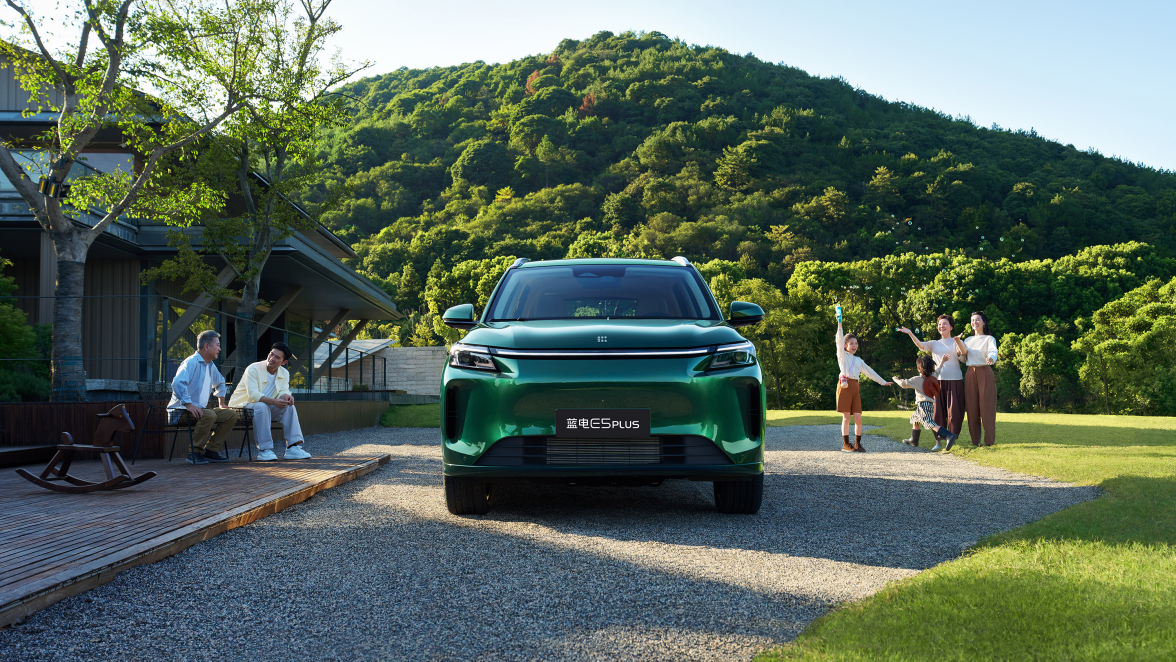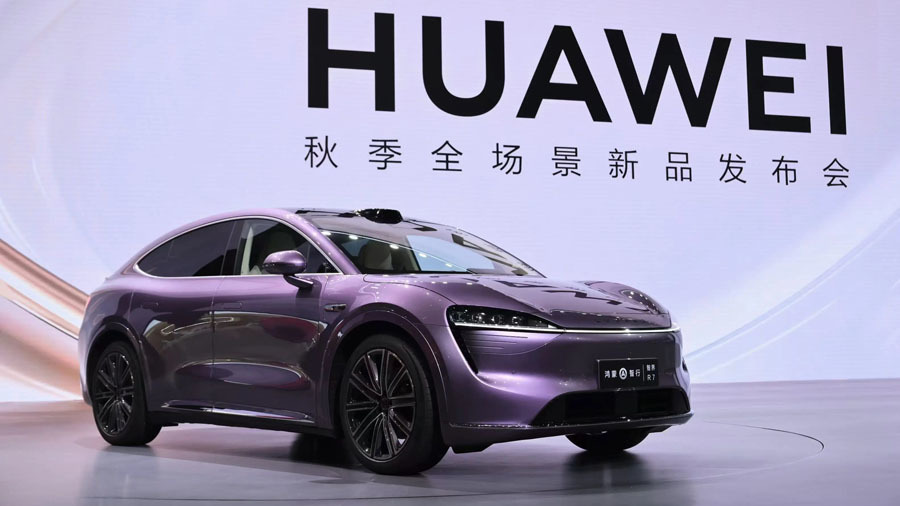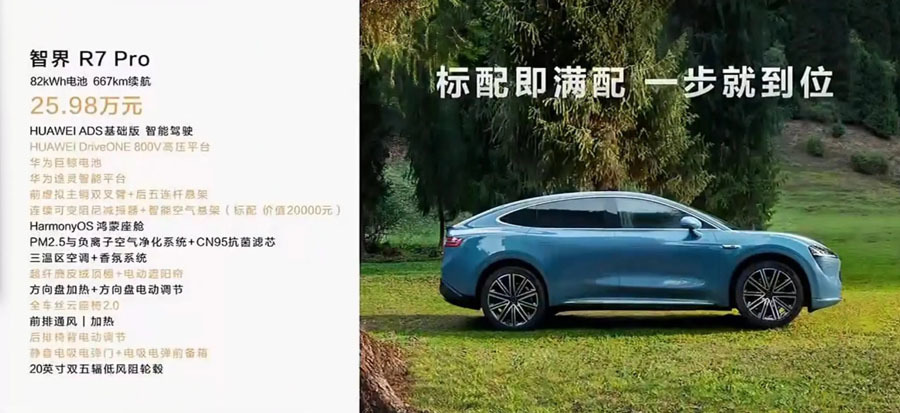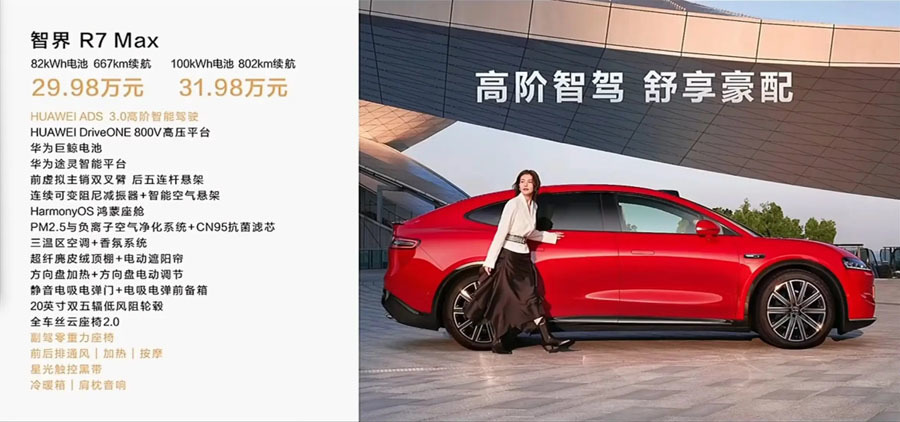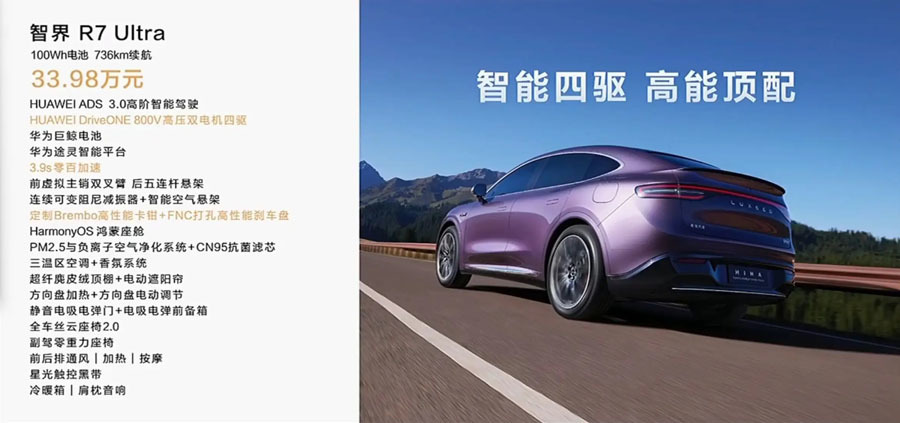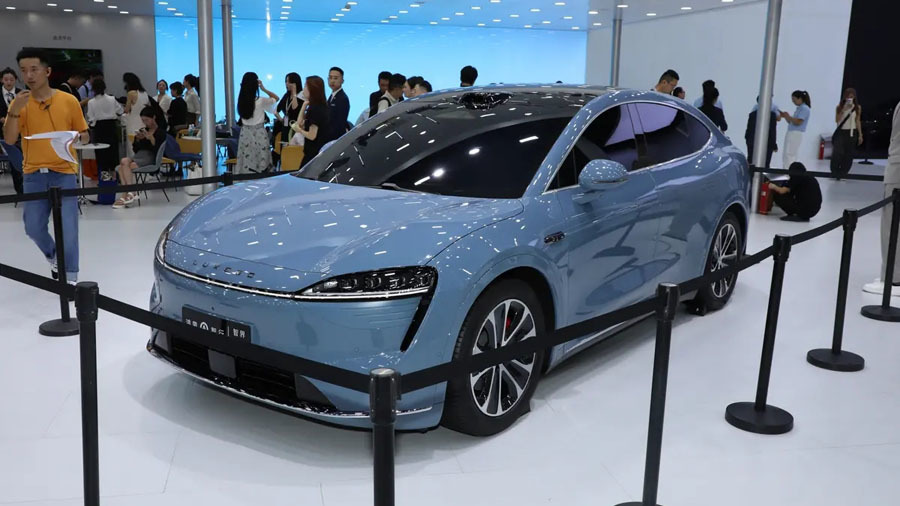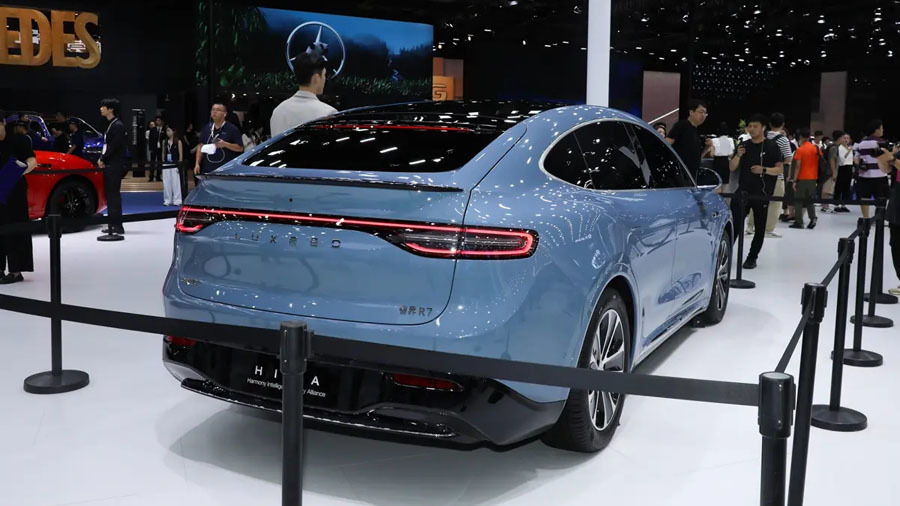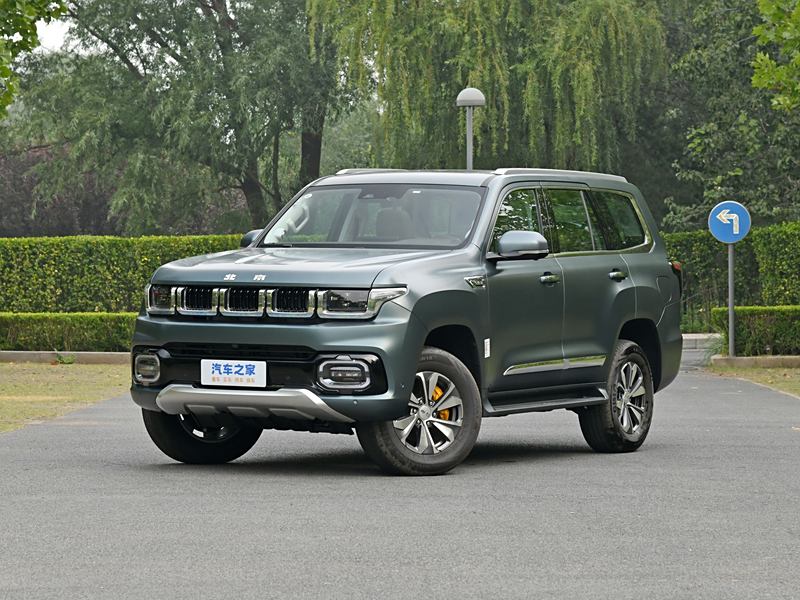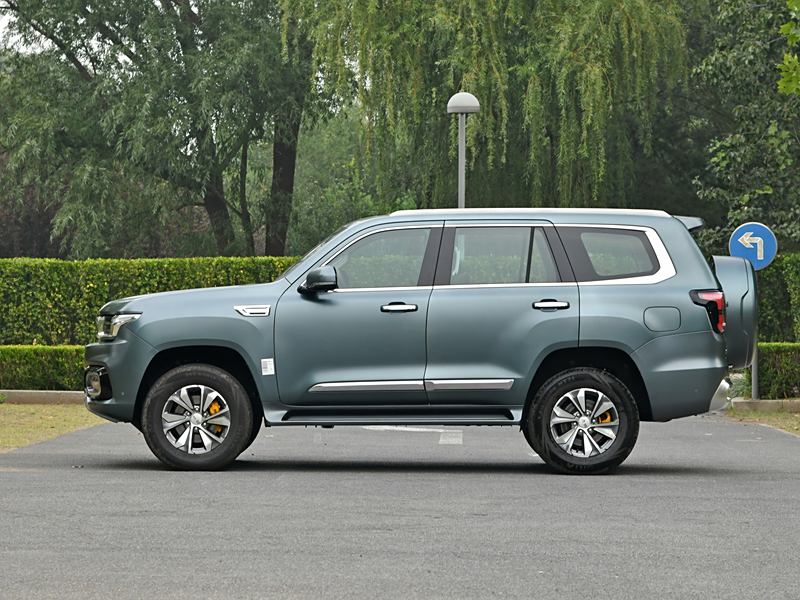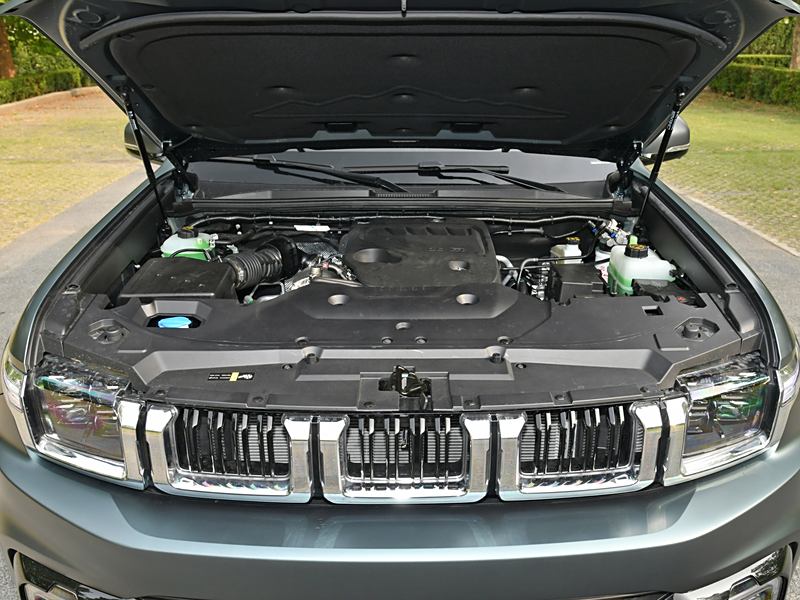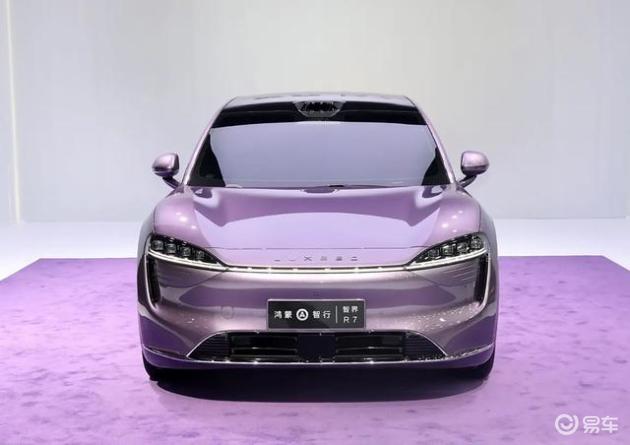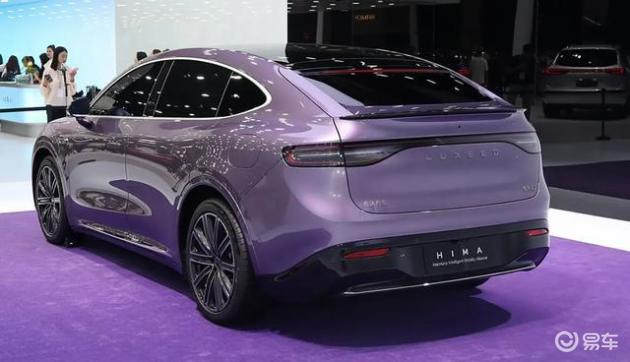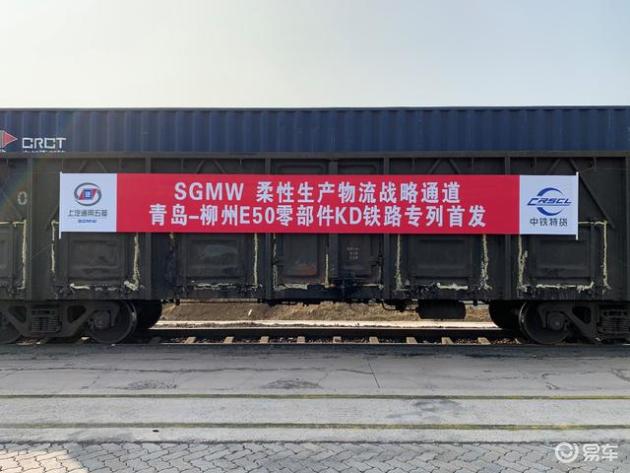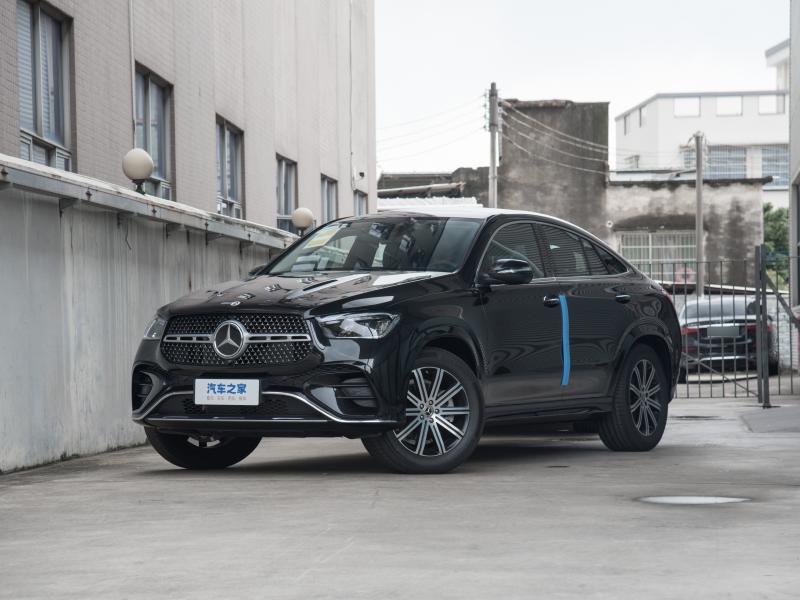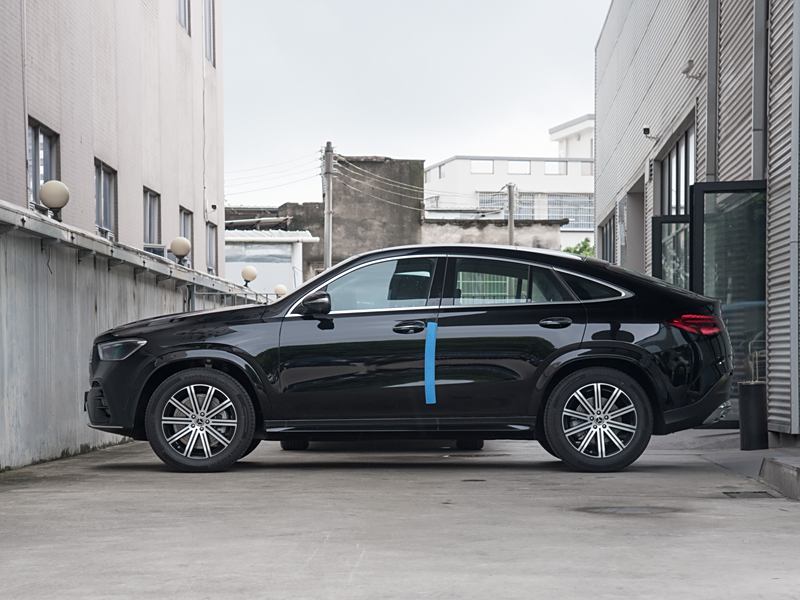[Autohome new car diagram] Although it is not yet April when new cars are listed, there have been many new forces in the domestic car market recently. In mid-March, Changan Volvo’s S80L made its debut in the early stage, followed by Volkswagen’s R36 and BMW’s 740i leading models. And just as March is drawing to a close, the weather in Beijing is getting cooler and cooler every day, but the enthusiasm of manufacturers for new car releases remains undiminished. Today we are going to introduce this Lexus RX350 Premium Edition, a fresh model that was launched on the 25th, and it is still steaming.

For the Chinese market, Lexus is indeed a very young brand. It has entered the country for only a few years, but its brand recognition and market share are increasing day by day. And one of the earliest Lexus models to enter the country is its high-end SUV – RX car series. After years of hard work, the old RX has been a little tired, and the new RX came to China just two months after the launch of the Los Angeles Auto Show in January this year. The almost simultaneous global release reflects Lexus’s emphasis on the Chinese market. Now let’s take a look at this new model that you and I are not very familiar with.
Appearance – Sedan style shows sporty high performance
The RX car series itself is very young. The first generation model was born in 1999, and the brand new third generation model appeared in front of us when the car series was 10 years old. Compared with the previous generation model, the change in the shape design is obvious, but we don’t think there is much comparison between the two, because the design of the two generations is 6 years apart, and the model positioning and design trends have changed during this period, so we should treat the new RX as a brand new model.
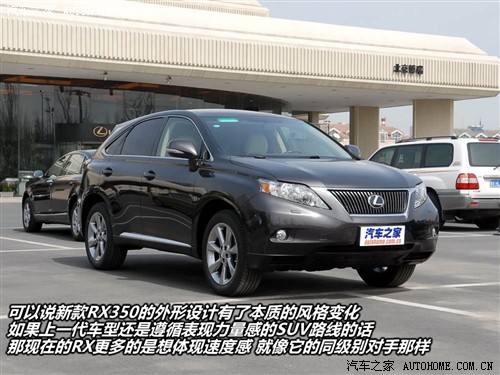
Six years ago, we were still relatively unfamiliar with the so-called cross concept, and major manufacturers did not consider it too much, so the previous generation RX launched in 2003 looked as tall and strong as most SUV models. But now with the emergence of BMW X6, Infiniti EX and other models, such slightly obscure models have become the new favorite of consumers. The new generation of RX shape design born in this environment also bears a clear brand of the times.

Although the design style is quite different from the previous generation model, the body size is the same level and has increased. The new car has signs of increase in length, width, height and wheelbase, but it doesn’t look obvious, because even the most changed length has only increased by 41mm, which is difficult for the naked eye to detect.
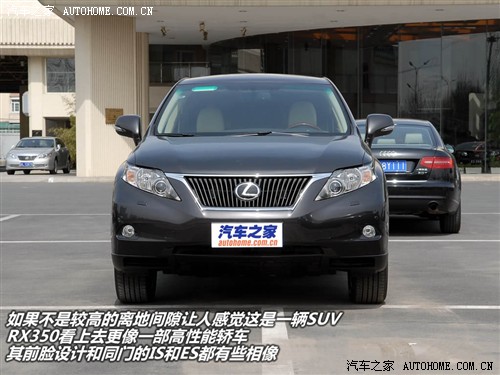

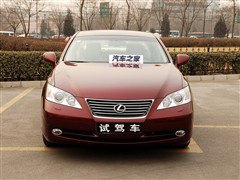
"The front face of RX is somewhat similar to IS (left) and ES (right)."
Does the front face look very familiar, similar to some models in the Lexus family. Lexus has sedan models except RX and LX, but obviously the current RX and full-size off-road vehicle LX series have nothing in common, and now I finally know where that sedan-like appearance comes from.

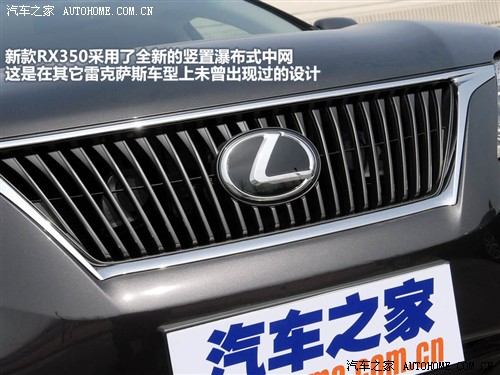
The new RX350 is no longer as layered from the side as it used to be. Now it pursues the eye-catching and stylish sense of the positive visual effect, and in fact it has already done it. Using the clever connection between the new-styled headlights and the middle net, the front face of the RX now looks more sporty and modern. The straight waterfall-style middle net and the inner corner of the downcast headlights have made efforts to show a sense of speed. But despite being a crossover model, the RX still lacks a bit of due domineering and appears too refined.
From the front, we couldn’t see any hereditary connection between the new RX and the old model, as the style of the new model was completely determined by the route of the CROSS model, but when we looked at it from the side, the familiar impression immediately came to mind.
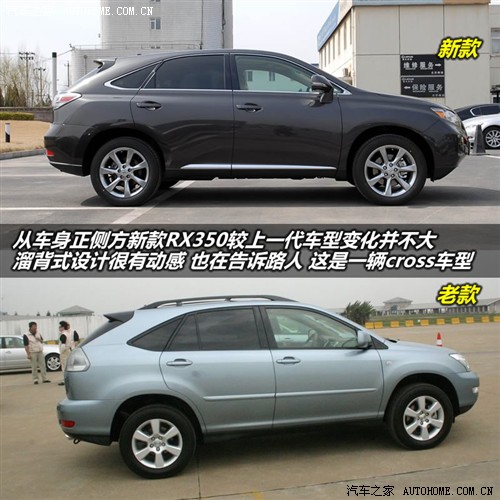
As can be seen from the above picture, there is almost no difference in the side design between the old and new models. The backslide design and the small triangular window on the C-pillar are completely preserved. From this angle, we can still clearly feel the tall body of the RX and the high waist line design full of power, which is much more domineering than the front face that is too sedan-like.
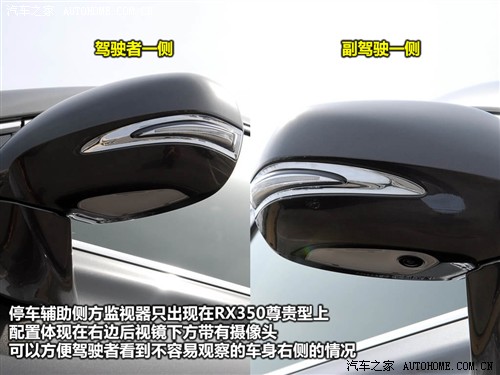
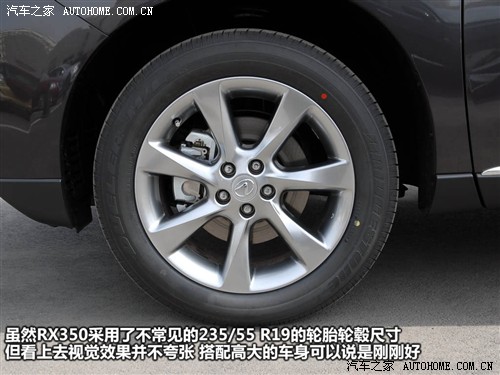
The RX350 features a new wheel design. Although the effect is similar to that of the previous model, the details are more refined, the surface curve changes are more dynamic, and its size is an amazing 19 inches. However, even this size of the wheel is not exaggerated on the RX, which shows that the RX’s figure is still heavyweight.

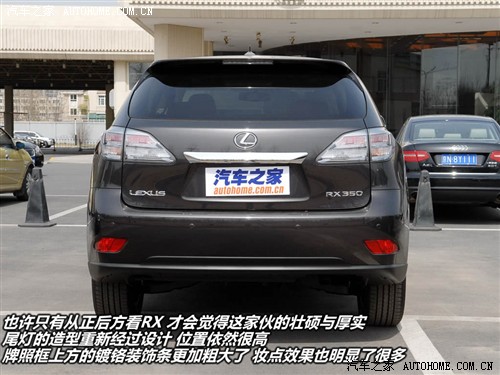
Although the RX’s tall figure can be seen through the contrast of the wheel hub, the smooth body curve is still closer to the category of high-performance cars, so only when looking at the RX from the rear can it show the true sense of power that belongs to the SUV.
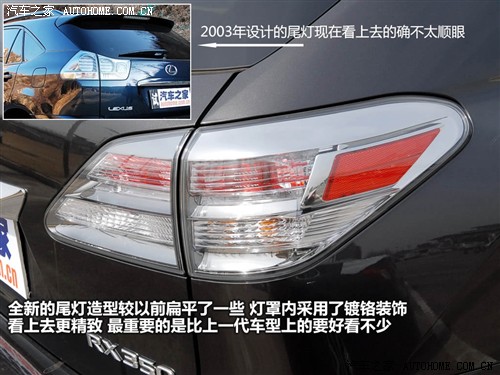
The taillights of the new RX350 have also been redesigned, and the type of LED light source has been continued. The current flat shape is more fashionable and delicate than the previous taillights. There are many places where chrome decoration is used, but it is not objectionable. The almost all-white taillights and the dark body produce a strong contrast, and the visual effect is more prominent.
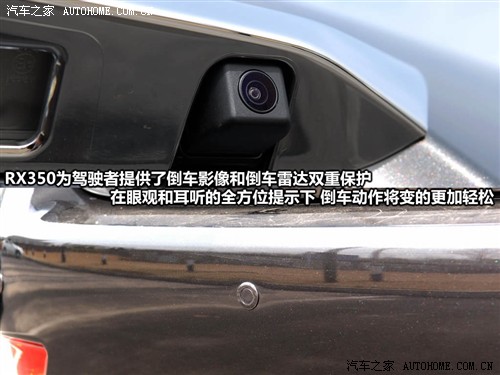
We have already mentioned that there is a camera under the rearview mirror on the passenger side, which is certainly not all the equipment of the RX. There is also one under the rear license plate frame. If you are still worried about reversing, the RX350 also has four reversing radars. Under this omnidirectional and multi-angle prompt, the driver’s reversing position control will become easier.
Center Console Interior – Rich Configuration, Stylish Style
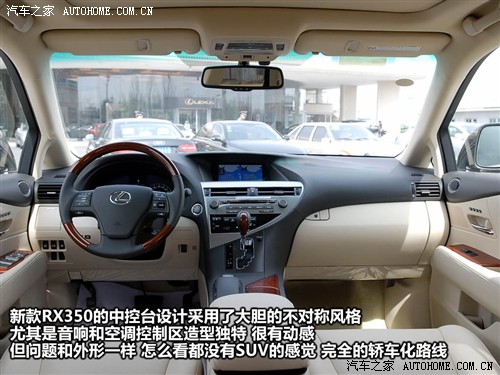
After seeing the new RX shape, we felt that it was full of innovation, and after entering the car, we found that the changes inside were also obvious. The most striking thing is the design of the center console panel. Unlike ordinary models, the RX350 adopts a left-right asymmetrical design, and the silver trim is like a raised sail, which is very dynamic.

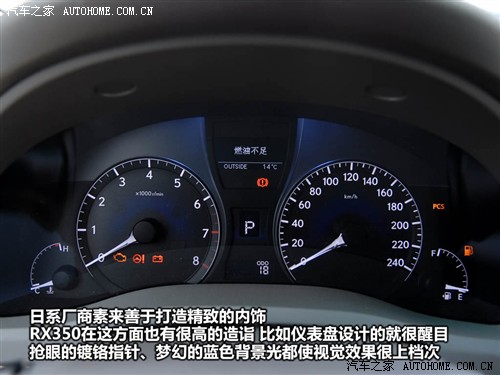
Toyota has always had the means to create gorgeous interiors, and the instrument panel lighting effect is one of the commonly used methods, and Lexus, a high-end brand of Toyota, is even more adept at this. Unlike the instrument panel on models such as the Camry, the RX350 does not make the instrument panel too dazzling, but uses deep blue to show a dreamy and ethereal mood, and the visual grade is also improved.
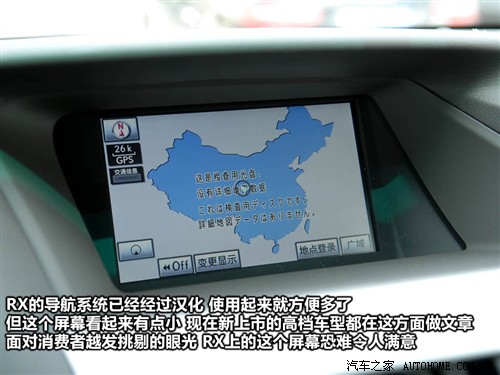
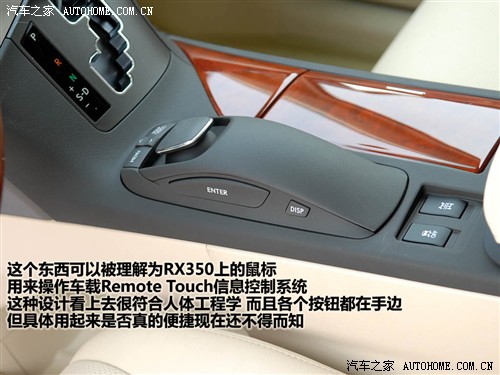
The new Remote Touch information operating system is currently only available on the new RX350, just like BMW’s iDrive and Mercedes-Benz’s COMAND. This operating system can freely switch between interfaces such as navigation, vehicle information and multimedia playback. The control method of this system is very special, like a set of car mice, which can easily perform a series of simple and efficient information operations by controlling the cursor.
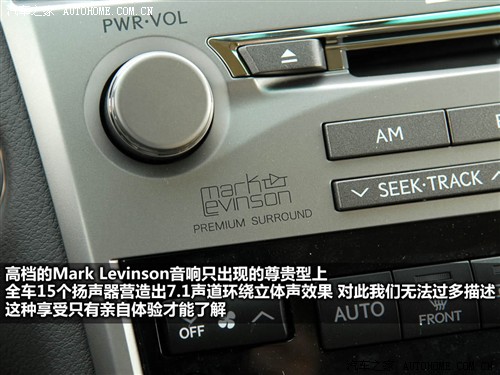

The sound system of the RX350 Premium Edition is indeed worth showing off. The Mark Levinson audio with 15 speakers belongs to the high-end brand of Harman Card, and the effect is naturally needless to say. If you have the opportunity to listen to it once, you can appreciate the realm of natural sound. However, compared with the functionality of the air conditioning system, although it is a partition air conditioner, the air volume cannot be adjusted separately in the front and left rows, and the rear passengers have no control over the air conditioner.
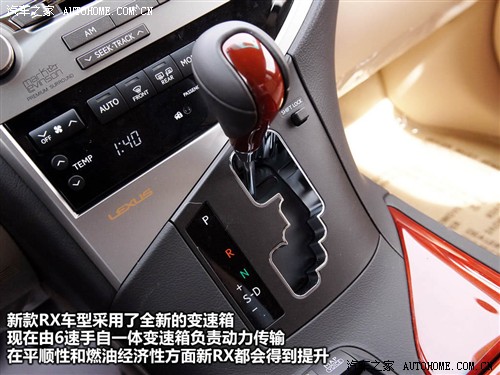
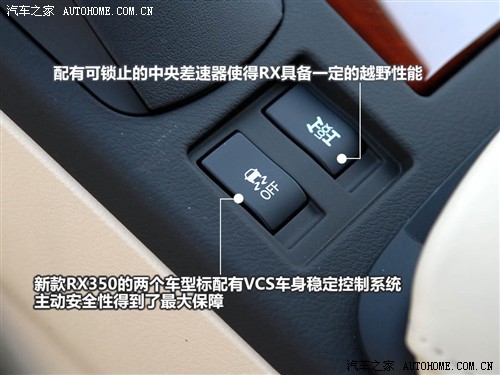
The new RX350 abandons the old 5-speed automatic transmission and adopts a new U660F six-speed automatic transmission. According to the official claim, this transmission can improve power transmission efficiency and improve fuel economy by locking the hydraulic torque converter. As a high-end SUV model, the RX350 comes standard with a VSC body stabilization system and a lockable central differential, and off-road performance is not to be underestimated.
Seats and space – powerful seats, slightly smaller luggage compartment
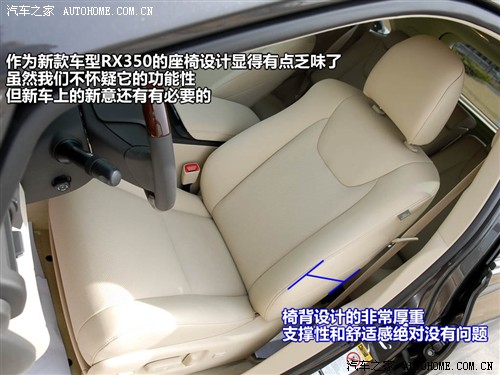
In terms of appearance and interior design, the RX350 has always been fresh, but when we saw the seat, a word immediately popped up – mediocre. The seat seems more suitable on the Camry, and the generous and chunky shape makes people have no doubts about its comfort, but the shape is a bit monotonous.
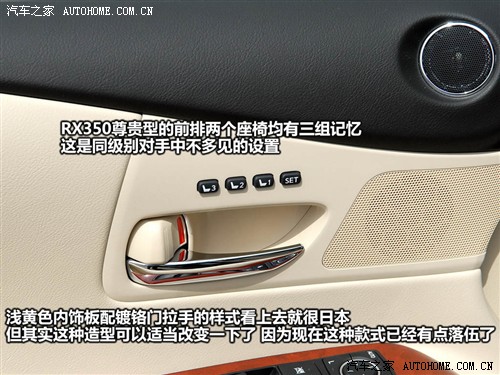

However, the mediocre appearance did not mean that the seat of the RX350 had no advantages. The powerful functions made many competitors feel ashamed. In general models, only the driver’s seat had a seat memory function, while the RX350 Premium Edition extended this function to the passenger seat. Not only that, but a full set of seat heating and ventilation functions were already equipped, and the high-end leather material could also be warm in winter and cool in summer.
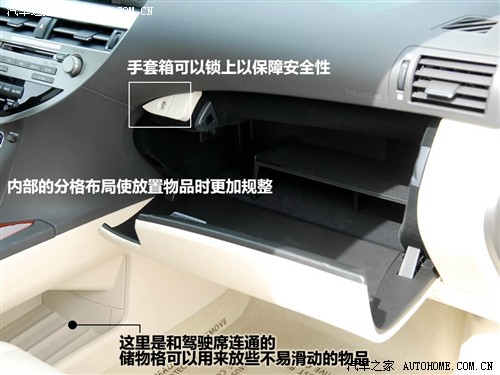
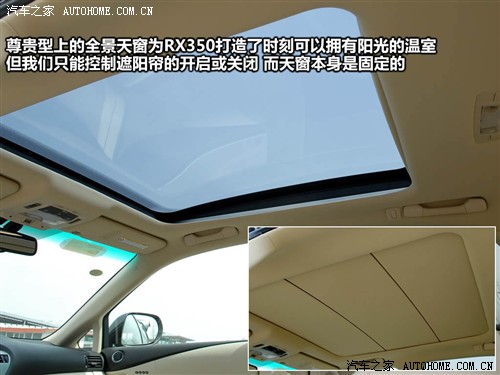
In addition to the seats, the panoramic sunroof on the RX350 Premium Edition is also an attractive highlight. Passengers in the car can control the opening or closing of the sunshade by pressing the button. The bright sunlight can fill the car in an instant, but the fly in the ointment is that the panoramic sunroof cannot be opened.
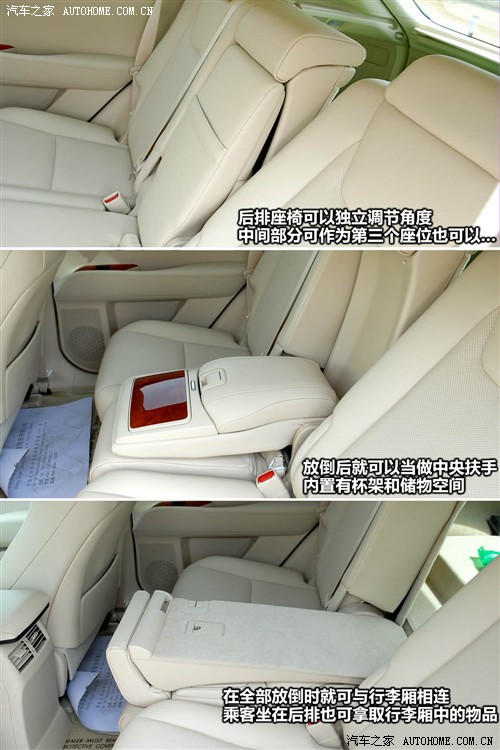
However, compared to the front seat, the rear seat functionality of the RX350 is much inferior, with no additional features except for the adjustable seat back angle. However, the rear seat, which can be divided into three parts and reclined down, allows for more flexible changes in the luggage compartment space. When reclining in the middle part, rear passengers can also conveniently take or store items from the luggage compartment without stopping.
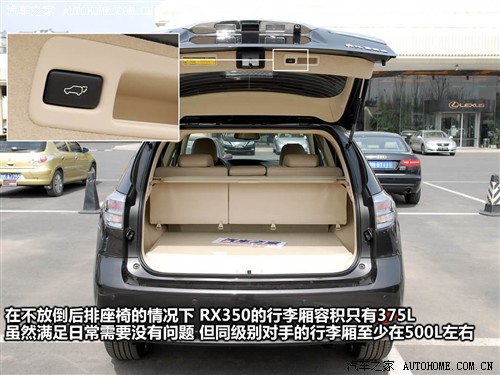
Finally, let’s talk about the luggage compartment of the RX350. Although the size of the RX is not small in terms of appearance, the volume of the luggage compartment in the initial state is not commendable. The level of 375L can basically meet daily needs, but it is a bit too small compared to competitors.
Summarize:
As a new Lexus model, the RX350 brings us the freshness and luxury that it deserves. The design orientation of the crossover model is more in line with the current model positioning, and it looks more in tune with the atmosphere of the city. And through the new coat, the design inside the car is also very attractive. The 6-speed automatic transmission and Remote Touch control system are the first to appear on the RX. The functionality of the front seats is impressive, while the situation in the rear is not optimistic. For users who like to pursue novelty and have good economic ability, the appearance of the new RX will give them an extra choice, but for most consumers, the RX series is still as far away as ever. ( Text/Photo Autohome Zheng Yu, Photography Autohome Zhang Lei, Ren Chaoliang)
Thanks to the following dealers for their vehicles
Beijing Borui Lexus
Beijing Borui Lingzhi Automotive Sales and Service Co., Ltd.
Address: No. 161, South Fourth Ring Middle Road, Fengtai District, Beijing (Exit 24)
Telephone: 010-87582119
● Vehicle parameter configuration




